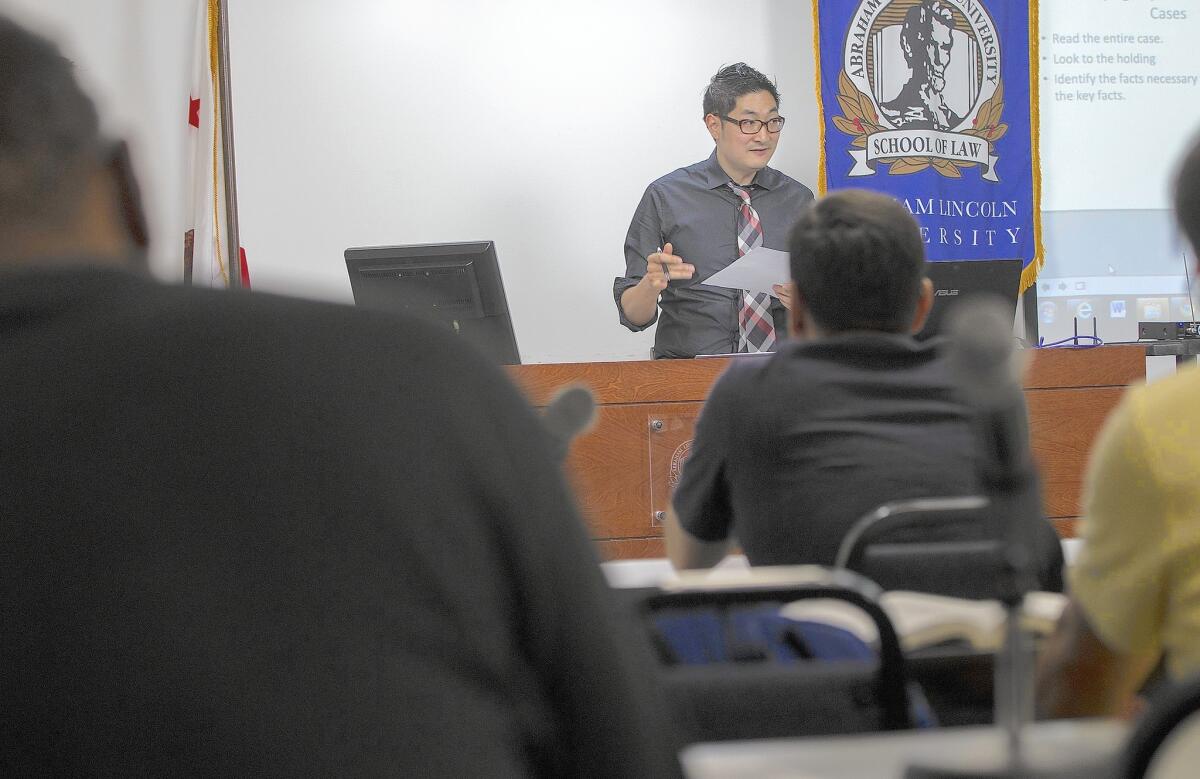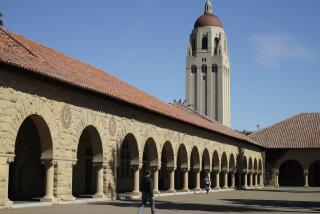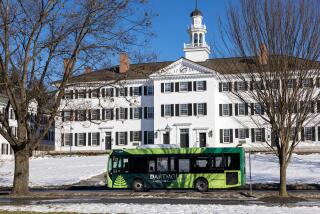State bar urged to require unaccredited law schools to disclose graduation, dropout rates

Legislators and legal experts are urging California bar officials to require the state’s unaccredited law schools to be more transparent to give prospective students a better idea of their chances of becoming an attorney.
The proposed changes, which include the disclosure of such information as dropout rates and alumni employment, would mirror similar changes made by nationally accredited law schools such as UCLA and USC.
The proposals come after a Times investigation last month showed that nearly 9 out of 10 students at those schools dropped out before their final year of study. About 1 in 5 unaccredited law school students who finish these programs pass the bar each year, according to state statistics.
Currently, the state’s 22 unaccredited law schools are not required to disclose the number of graduates who get jobs in the legal field. The schools report the number of dropouts in annual reports to the state bar that are available only upon request and not readily available to the public.
“I think [disclosing data] is something that could be easily done that would be of great benefit to consumers,” said state Sen. Marty Block (D-San Diego), who said he would introduce legislation requiring the disclosures in the next legislative session. “You should know what you’re getting into.”
State bar officials, who oversee unaccredited law schools, are considering rules to require these schools to meet more academic standards within a decade, including maintaining a 40% bar passage rate over five years. The proposed regulations, however, do not include graduation and dropout rates, among other things.
Patti White, chairwoman of the state committee of bar examiners, said she is unsure when such proposals could go into effect.
White and other bar officials declined to say whether they thought unaccredited schools should be required to follow the lead of schools like UCLA, which are accredited by the American Bar Assn. Those schools must publish statistics showing student attrition rates and demographic information, the numbers of graduates with jobs requiring law degrees and the number of those who don’t get jobs in the field.
Unaccredited schools serve mainly older students who often have jobs and families. The schools charge lower tuition — some charge $3,000 a year — and offer part-time courses. They enroll about 1,500 new students each year, and the majority attend online classes.
Students at those schools must also pass a state-administered exam after their first year before they are allowed to continue their legal education. Pass rates for that exam, known as the baby bar, generally are around 20%, according to state data. Many students drop out before they take the test, state bar records show.
Assemblywoman Catharine Baker (R-San Ramon) said that she also wants prospective students to have more access to information, but that state bar officials should have the initial opportunity to make changes.
“They should have the first crack at this,” Baker said. “If they don’t, I’d like to know what case they make for [not disclosing information] before diving into legislation.”
A spokesman for Concord Law School of Kaplan University, the state’s largest unaccredited law school, said administrators are not opposed to publicizing more information about dropout rates and employment statistics. “It is something we would look at and consider,” said Stephen White, vice president of communications for Kaplan Higher and Professional Education.
George Gliaudys, the dean of Irvine University College of Law in Cerritos, a smaller unaccredited school, said he supports more transparency. “I think it could be helpful,” he said.
The American Bar Assn. is considering implementing new rules that would require nationally accredited law schools to release more information about attrition rates, including disclosing the number of students who leave voluntarily and the grade point averages and LSAT ranges of students who drop out.
“Many students take on enormous debt to attend law school, and they should at least be told their real odds of graduating,” said Peter Joy, a Washington University School of Law professor who also works with the national bar association.
If the State Bar of California fails to require unaccredited law schools to begin meeting new academic standards, Block said he would back additional legislation to do so.
“If the state bar doesn’t do it then the consumer protection concern would fall back to the state,” Block said. “Somebody will have to do it.”
Joe Dunn, the state bar’s former executive director, said he thought the 10-year time frame for unaccredited schools to meet new standards was too long. Dunn suggested that the schools be given a three-year window.
“With bad schools it doesn’t matter. We could give them a year, we could give them 50 years, and they’re not going to make it,” he said.
Laurel Miller, a Tacoma, Wash., resident who enrolled in Concord in 2011, said she had little choice but to believe school recruiters who assured her that “they had all of these wonderful rates” of the number of students who passed the bar and graduated.
Miller, 41, said professors at the online school seemed unprepared, and she decided not to return for her second year. If she had known about the high attrition rates, Miller said she wouldn’t have signed up in the first place.
“That would’ve been a sign to me that something wasn’t working,” she said.
Twitter: @byjsong
More to Read
Start your day right
Sign up for Essential California for news, features and recommendations from the L.A. Times and beyond in your inbox six days a week.
You may occasionally receive promotional content from the Los Angeles Times.







